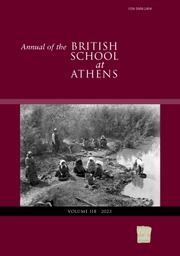No CrossRef data available.
Article contents
Trade Routes and Constantinople
Published online by Cambridge University Press: 20 December 2013
Extract
The text for this paper is taken from a review of my Troy in the Pall Mall Gazette for December 21, 1912. One does not usually take notice of anonymous reviews in the daily press, or answer them at large; but in this case the article is signed by the initials H. A. O., which are transparently those of a serious scholar, entitled to all respect even when he is wrong; and his views have further been adopted and enforced in another review of Troy published in the current number of the J.H.S. under the equally transparent initials of T. W. A. This raises the question above the level of ordinary journalism, and may, I hope, justify further discussion. For both articles involve problems which go to the very root of the whole question of ancient trade routes; and the views of both scholars seem to me so fundamentally erroneous and misleading that they should not pass without challenge. It is my intention to leave out of sight all mere matters of detail in both reviews, and to confine myself to what is really vital. It is, I presume, the wish of both gentlemen that I should retain the pretence of anonymity, so I shall refer to them under the initials which they have themselves preferred.
- Type
- Research Article
- Information
- Copyright
- Copyright © The Council, British School at Athens 1912
References
page 303 note 1 It will be noticed that the idea of transport by land is not, to the commercial mind, worthy of mention.
page 303 note 2 The straits were reopened to navigation on May 1.
page 303 note 3 θρέμματα. But the word must be wrong, unless Polybius used it in the general sense of ‘food-stuffs,’ which I cannot believe. Al. δέρματα, which is better though inadequate. Live animals are an instance where land transport has the advantage over sea, and are therefore almost entirely supplied by local and not by international traffic in early days. Steam of course has made a difference. In any case the Pontus hardly touches on pastoral districts; those in the centre of Asia Minor are cut off from it by difficult mountains.
page 305 note 1 Cicero, , Prov. Cons. 4Google Scholar, uia illa nostra quae per Macedoniam est usque ad Hellespontum militaris. Later on, when Byzantium became the centre, roads were made to the capital from Kypsela where it crossed the Hebrus, and the Hellespontine link became useless. Thus it is that the itineraries do not carry the road eastward beyond Kypsela. So at least I interpret the facts given by Oberhummer in Pauly-Wiss. v. 1989 ff.
page 305 note 2 See Historical Geography of Asia Minor, p. 25.
page 306 note 1 It will be seen that the railway is expected actually to diminish the amount of such land-borne trade as there is.
page 306 note 2 “Dede Agatch …. is the principal port for the export of the products of the sandjak of Adrianople. The principal exports are cereals, hides, and tobacco. The small harbour is very shallow, only affording shelter for lighters and small vessels; it has silted up considerably since it was opened in 1872, and has not been dredged, consequently it is very difficult for lighters to load at the quay. … There is no protection from south-west winds, which occasionally blow with great violence, and cause a heavy sea. … The anchorage off Dede Agatch is not safe in a gale from S.E. round by south to W.S.W.; although the holding ground is not bad, an exceedingly disagreeable sea gets up with very little wind, and during a gale the whole place is one sheet of foam.” (Medit. Pilot, iv. 125.Google Scholar)
page 308 note 1 And also by myself: Troy, p. 295.
page 308 note 2 Probably further east: W. L.
page 308 note 3 The last sentence is wholly unintelligible to me. Bithynia is not absent ‘in’ (from ?) the Catalogue; it appears under the name of Askanie, and is inhabited by the Phrygians, whose frontier extends to the Sangarius. If T.W.A. means not Bithynia but the Bithynians, their absence is accounted for by the fact that they had not yet crossed from Thrace. That is one of the signs of the genuine antiquity of the Catalogue. And why should the absence of Bithynia be explained by its position upon a trade-route ? As for Pontus, I do not know whether T.W.A. means the country or the sea. In the former case it is not absent, but appears as Alybe, the country of the Halizones. If T.W.A. thinks that the Catalogue ought to give the name of the kingdom of Mithradates, he will further have to explain—again doubtless for the first time—the absence of the name of Alexandria Troas in the Catalogue. If he means the sea, will he give a list of the seas which the Catalogue does name, other than the Hellespont? And why should the absence of Bosporus and Pontus from the Trojan Catalogue need more explanation than the absence of Euripus and Aegean from the Greek ?
page 311 note 1 ‘Einige neuerdings bei Akalan gefundene mykenische Gefässscherben bringen, da an eine spätere Verschleppung kaum zu denken sein wird, bereits den Beweis dass die mykenisch-ägäische Welt zu diesen Küsten Beziehungen hatte.’ (Note). ‘Ich verdanke die Nachricht von ihrem Vorkommen einer gütigen Mittheilung des Herrn. Prof. L. Curtius in Erlangen.’
page 312 note 1 Journal of the Archaeological Inst., Nov. 1897.




